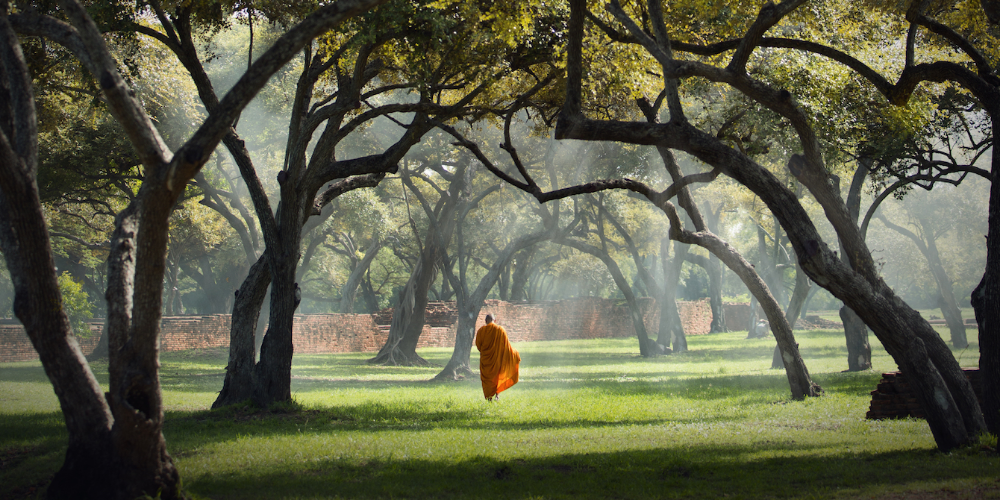The Five Faculties found in Buddhist psychology address the problems of our human condition and the suffering experienced in the mind and body. This topic reminds me of a story from the Buddhist teachings:
There was once an ancient city that was far off in the jungle one that had an abundance of prosperity. All the people who lived there had delight with being alive, felt joy, were at peace they had a quality of tranquility and happiness.
At one time, the path to this city was easy to find and the way clearly marked. All were welcome.
But over the centuries, fewer people would seek this path and as time went by the trail became overgrown with vines, fallen trees, and bushes. Finding the path and the city became difficult and arduous.
The Buddha during his journey to find the answers to freedom from suffering ( described as Nibbana or Nirvana) rediscovered this path, long forgotten.
The Meaning Of Suffering in Buddhist Psychology
When I speak of suffering, I mean the dissatisfaction with life, that we all face at one time or another. Some other definitions to this word suffering from a Buddhist psychological perspective might be mental anguish or stress.
Often in Buddhism, we think of suffering as trauma or catastrophic loss. The teachings in Buddhist psychology also describe suffering as adverse life events, challenges we face in everyday life. Through the lenses of mental health and well-being, we may even use words like depression, stress, anxiety, fear, low self-esteem or the deep-seated belief that I am not good enough.
Having experienced freedom from this dissatisfaction, The Buddha, like others before him, marked the path and a clear way for us to rediscover this Ancient city.
Read more: Darren Cockburn shares five truths that can enable freedom from psychological suffering.
Rediscovering The Ancient City Of Contentedness
After all, don’t we all want joy, peace, ease, and contentment in our lives?
Even if we resist it at first or think we are not worthy of such things. I believe our core desire is to find a level of contentment in life. A lasting peace and ease that we may call well-being.
I hope you have recognized by now that this Ancient city is not a place but a state of mind. We need to uncover the path we need to follow, the map laid out by the Buddha and those before him. This is an inward journey of our hearts and minds. So, the journey will be difficult and the path obstructed by the many habits, conditions, and perceptions that perhaps have blocked our true nature.
Read more: Buddhist monk Ajahn Achalo and Buddhist teacher Dr. Miles Neale and reflect on what it means to be a Buddhist.
The Five Faculties Of Buddhist Psychology
To begin this journey, we must develop a few skills — known as the Five Faculties in Buddhism which later, with practice, become powers. Through practice and development, we can overcome obstacles on the path to ease and contentment.
The skills we must strengthen, develop and implement are:
- Confidence / Faith
- Effort/ Energy
- Mindful investigation
- Concentration
- Wisdom
Before he dives deep into the Five Faculties of Buddhism, you might want to pause and practice stillness with one of Jason Murphy’s guided meditations:


- Liberation Of The Heart Jason Murphy 19:59
- Loving Kindness (Metta) Jason Murphy 11:11
- Mindfulness of Emotion Jason Murphy 7:36
- Big Sky Meditation Jason Murphy 6:00
- Liberating Power of Awareness Jason Murphy 14:38
Read more: Buddhist teacher Scott Tusa reflects on the four seals of Buddhism and how to inquire them.
Confidence
Developing inspiration or faith in the practice and the path — has this happened for you? Perhaps a friend who has begun to meditate, gone on a retreat, taken a stress reduction course. If we can see in others the changes and shifts after trying meditation, we can gain confidence in our ability. Perhaps a teacher or book has inspired you to trudge the road to your best self.
Effort or energy
Now that we have some inspiration maybe you downloaded an app or searched for a meditation class in your area. Following through this is a challenge, and continued effort is necessary at first. Joining the wise effort with inspiration and confidence is what is needed to keep us going.
Discover thousands of free guided Buddhist meditation practices, inspiring lectures, and music tracks.
As we begin to practice, we will start to notice a few things. As soon as we close our eyes or on your way to the first class, we begin to experience the habits of mind, challenges we face perhaps every day. Training the mind or collecting attention is more difficult than anticipated.
These are the usual suspects on our path and can be changed. We need to learn to rebel against what is Familiar, Predictable, Safe, and Painful. These are the habits of mind we have been learning for a lifetime. It is, of course, not our fault. It is part of the human condition to fall into patterns of seeking pleasure and avoiding pain. Even though it is not our fault we are not to blame for these harmful habits, it is our reasonability to break free from their debilitating hold.
When we begin to give attention to the moment as it arises, we see the movement of our mind as we try to keep our focus on one thing like the breath. We often discover how completely out of control our mind really is.
We realize that our mind has a mind of its own. It is flighty, goes where it wishes. This is the first insight and should inspire confidence. It is often compared to teaching a dog to stay close and not just run off every time it sees, smells or thinks something. Let’s say you bring your dog to the beach, that dog wants to run, frolic, play and jump in the water, go here, go there. It has not been trained; yelling at the dog is not very helpful; they are just following their instinctual nature.
In the same way in meditation; we are beginning to see how the mind rebels against our wishes. It’s just an untrained mind. Like the dog, we need to harness the mind to keep it close. The mind, like a dog, needs to be tamed and trained to go against the instinctual nature.
Concentration
Concentration trains the mind to stay here in the present. Whatever that is, sitting, walking, eating, driving, or taking a shower. Harnessing the minds ability to be here now, and establishing focused attention on the present activity is key in this type of mind training and necessary to progress on our path to freedom from suffering.
Mindfulness
Mindfulness can be described as seeing the stream of consciousness flowing like a river. I often hike in the mountains and trails by my home in Northern California. One of my favorite trails has a stream with a bridge over it. One day, I was standing on the bridge and watching the water so clear you could see right to the bottom. The water looked as though it was standing still and then a leaf fell into the water and floated downstream, and I realized that the stream, although clear, was moving quite fast.
Browse more than 4,000 guided mindfulness meditation practices that bring awareness to the present moment and develop openness, compassion, and curiosity.
Our minds are similar; it’s like seeing a stream calm and barely moving. Then putting a stick or log in the stream, which creates a wake and the water moves around the stick. Mindfulness is the stick of present time awareness. By placing attention on an object, like the breath, we begin to see the activity of the mind that, without it, would just be the flow of the river, hard to notice.
Wisdom
The last of the Five Faculties in Buddhism we call wisdom or wise understanding. In a traditional sense, this means seeing clearly what is.
Buddhist psychology points to seeing clearly and understanding that there is suffering in this life. That nothing is permanent, meaning all things change. And that there is no fixed you, that we are always changing and growing in a constant cycle of birth, death, and rebirth. These are lofty insights. I see wisdom as a product born out of the other four faculties.
Understanding The Interconnection Of The Five Faculties In Buddhism
My thinking about the Five Faculties in Buddhist teachings goes something like this.
Inspiration, or perhaps desperation starts us on the path. A combination of verified faith through the applied effort of establishing mindfulness and strengthening concentration leads to insight. And that insight leads to wisdom. Wisdom is seeing clearly that shit happens, all things change, and when we take it personally, we cause even more shit.
Of course, it is essential to make a distinction between knowledge and wisdom. Knowledge is learning and knowing, which can be a helpful step but it is not wisdom. For instance, if you read articles about meditation and Buddhism, listen to podcasts, learn a lot about it but apply zero or little effort into the practice, it is just that knowledge. Even though you can have a theoretical discussion about these topics you will find little freedom from the suffering that perhaps drew you here in the first place. Wisdom in this framework is the knowledge and experience of applying that knowledge into practice, which leads us to insight.
Read more: Stephanie Noble takes us on a journey to understanding what true happiness is. Explore how to connect with happiness in every moment, “even when conditions are such that there’s no blue sky to be seen at all.”
How The Five Faculties Of Buddhism Transform Into Powers
The cultivation of the Five Faculties will progress into what the Buddha called powers. I think the Buddha’s true intention for calling them powers is that they give us the power to choose our response. As these qualities become known and refined we are able to overcome their opposites:
- Faith or confidence counteracts doubt or disbelief.
- Concentration calms the restless mind, focusing on a mantra or repeated phrase settles the mind of worry or anxiety.
- Wise effort or energy will battle sleepiness or lethargy.
- Mindful investigation allows one to observe anger or ill will and not be swept away by it or taken over in an angry tirade.
- Wisdom overcomes the obstacle of craving, seeing clearly that nothing lasts and clinging to sense pleasure only leads to pain.
These are simple descriptions of how the Five Faculties of Buddhism can help us to overcome the obstacles along the path.
Learn more about Jason Murphy.







